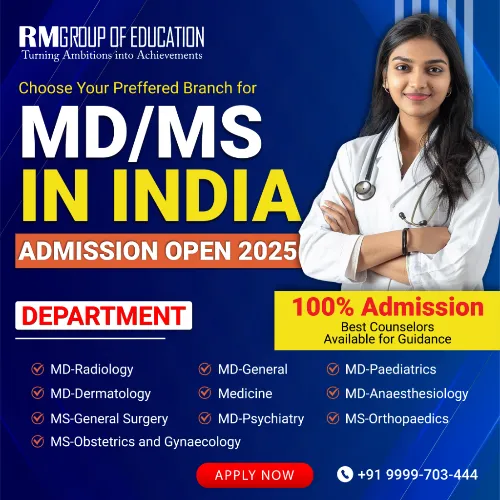MD/MS Admissions under NRI Quota: Indian colleges, especially for medical courses like MD and MS, offer a special category of seats under the Non-Resident Indian (NRI) quota. This quota helps NRIs, Persons of Indian Origin (PIOs) and Overseas Citizens of India (OCIs) get into these colleges more easily. It allows Indian students living abroad to study medicine in India and stay connected to their roots while receiving a good education.
In this article, you can explore information about the MD/MS Admissions under NRI Quota like Fees, Syllabus, Exams, Top Colleges and Career Scope.
[Page Index]
Highlights
The below sections shows the MD/MS Admissions under NRI Quota highlights.
| Criteria | Details |
|---|---|
| NRI Quota Eligibility | Candidates must be NRIs, OCIs (Overseas Citizens of India), or PIOs (Persons of Indian Origin). |
| Sponsor Requirements | Sponsor should be a first-degree relative, such as parents, siblings, grandparents |
| NEET Requirement | All candidates must qualify in the NEET-PG examination. |
| Seat Allocation | NRI quota seats are available in Deemed Universities, All India Quota, and some State Quotas. |
| Documents Required | Passport, visa, NRI certificate, sponsorship affidavit, and NEET scorecard |
| Tuition Fees | Generally higher compared to the general category; fees vary by institution |
Why Study an MD/MS Admissions under NRI Quota
The NRI quota offers medical students an easier path to secure seats in Indian medical colleges, especially for Non-Resident Indians (NRIs), Persons of Indian Origin (PIOs), and Overseas Citizens of India (OCIs). It is ideal for those seeking quality education in India with reserved seats for medical programs like MD and MS.
- Reserved Seats: NRI quotas ensure a certain percentage of seats in prestigious medical colleges.
- Access to Quality Education: Enables NRIs to pursue higher medical studies in India’s top institutions.
- Global Opportunities: Offers a mix of international exposure and home-country connections.
- Ease of Admission: Easier admission process compared to the general category due to reserved seats.
Eligibility Criteria for MD/MS Admissions under NRI Quota
To gain admission to the MD/MS Admissions under NRI, you need to fulfill the eligibility criteria set by your chosen college or institute. Candidates who do not meet these requirements will not be permitted to participate in the admission process.
| NRI Quota Eligibility Criteria | Details |
|---|---|
| NEET Exam | Must have successfully cleared the NEET exam. |
| Valid Passport | Must possess a valid passport. |
| Parent’s NRI Status | At least one parent must be residing abroad as an NRI. |
| Sponsorship Requirement | Sponsor must be a first-degree relative and an NRI. |
| Bonafide NRI Status | Seats are allocated only to bonafide NRIs. |
| Blood Relation | Must have a real blood relation to the sponsor (mother, father, brother, sister, aunt, or uncle). |
MD/MS Admissions Process under NRI Quota
The following section provide admission process for MD/MS under NRI Quota.
| Criteria | Details |
|---|---|
| Admission Process | Apply via NEET-PG, then participate in centralized counselling through Medical Counselling Committee (MCC). |
| Fees | Higher than regular quota seats; varies by institution. |
| Counseling Rounds | Multiple rounds of counselling held for seat allocation based on NEET-PG rank. |
| Validity of NRI Status | Proof of valid NRI status must be provided throughout the course duration. |
MD/MS Admissions under NRI Quota Syllabus
We have mentioned the major topics of the MD/MS Admissions under NRI Quota syllabus.
| Year | MD Program Subjects | MS Program Subjects |
|---|---|---|
| 1st Year | Basic Medical Sciences (Anatomy, Physiology) | General Surgery, Surgical Skills |
| 2nd Year | Pathology, Pharmacology, Clinical Medicine | Orthopedics, ENT, Ophthalmology |
| 3rd Year | Internal Medicine, Pediatrics, Specialization Courses | Advanced Surgical Techniques, Specializations |
Top Colleges For MD/MS Admissions under NRI Quota
Here are the top medical colleges that offer MD/MS Admissions under NRI Quota.
| College Name | City | Intake Seats |
|---|---|---|
| Grant Medical College | Mumbai | 15 |
| Madras Medical College | Chennai | 10 |
| Bangalore Medical College | Bengaluru | 12 |
| B.J. Medical College | Ahmedabad | 20 |
| Sawai Man Singh Medical College | Jaipur | 18 |
| Kasturba Medical College | Manipal | 10 |
| Sri Ramachandra Medical College | Chennai | 8 |
| Subharti Medical College | Meerut | 6 |
| Amrita School of Medicine | Kochi | 10 |
| D.Y. Patil Medical College | Pune | 5 |
Required Skills For MD/MS Admissions under NRI Quota
Here are the required skills for MD/MS admissions under the NRI quota.
- Strong Academic Foundation: A thorough understanding of medical principles gained during MBBS.
- Critical Thinking: The ability to analyze complex medical situations and make sound decisions.
- Effective Communication: Skill in clearly conveying information to patients and colleagues.
- Team Collaboration: Experience in working effectively within a healthcare team.
- Adaptability: Flexibility to cope with the fast-paced and changing nature of medical environments.
- Attention to Detail: Careful attention to all aspects of patient care and medical procedures.
- Empathy and Compassion: A deep understanding of patient needs and emotional support.
- Research Aptitude: Skills in conducting medical research and understanding clinical studies.
- Time Management: The ability to efficiently manage time between studies and clinical responsibilities.
- Leadership Qualities: Capability to lead teams and initiatives in medical settings.
Salary Of MD/MS Doctors Under NRI Quota
The section below shows the different factors in the salary of a Doctor of MD/MS under the NRI quota:
To apply for the MD/MS Admissions under NRI Quota students must prepare the following important documents.
- NRI/PIO/OCI certificate
- MBBS degree certificate
- Mark sheets from MBBS program
- Internship completion certificate
- Valid passport
- Entrance exam scorecard (if applicable)
Career path you can choose after the course
Here are several career paths you can pursue after completing MD/MS studies under the NRI quota.
- Clinical Practice: Work as a specialist doctor in hospitals, clinics, or private practice. You can choose fields such as cardiology, pediatrics, or orthopedics.
- Medical Teaching: Join medical colleges as a faculty member. Teaching future doctors can be a rewarding career, allowing you to share your knowledge and experience.
- Research: Engage in clinical or medical research to contribute to advancements in healthcare. This can involve working in research institutions or pharmaceutical companies.
- Healthcare Administration: Manage healthcare facilities or departments, ensuring efficient operation and quality patient care.
- Public Health: Work with government agencies or NGOs to improve community health outcomes through public health initiatives.
- Telemedicine: Utilize technology to provide remote healthcare services, especially in rural or underserved areas.
- Consultancy: Offer expertise to healthcare organizations or set up your consultancy firm to advise on healthcare practices.
- Pharmaceutical Industry: Work in drug development, clinical trials, or medical affairs within pharmaceutical companies.
- Fellowship Programs: Pursue further specialization through fellowships in various medical fields.
- Global Opportunities: Utilize your qualifications to work internationally, leveraging the global recognition of Indian medical degrees



